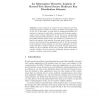Free Online Productivity Tools
i2Speak
i2Symbol
i2OCR
iTex2Img
iWeb2Print
iWeb2Shot
i2Type
iPdf2Split
iPdf2Merge
i2Bopomofo
i2Arabic
i2Style
i2Image
i2PDF
iLatex2Rtf
Sci2ools
CRYPTO
1999
Springer
1999
Springer
An Information Theoretic Analysis of Rooted-Tree Based Secure Multicast Key Distribution Schemes
Several variations of rooted tree based solutions have been recently proposed for member revocation in multicast communications [18, 19, 20, 21]. In this paper, we show that by assigning probabilities for member revocations, the optimality, correctness, and the system requirements of some of these schemes [18, 19, 20, 21] can be systematically studied using information theoretic concepts. Specifically, we show that the optimal average number of keys per member in a rooted tree is related to the entropy of the member revocation event. Using our derivations we show that (a) the key assignments in [18, 21, 20, 19] correspond to the maximum entropy solution, (b) and direct application of source coding will lead to member collusion (we present recently proposed solutions [21, 20] as examples of this) and a general criteria that admits member collusion. We also show the relationship between entropy of member revocation event and key length.
| Added | 04 Aug 2010 |
| Updated | 04 Aug 2010 |
| Type | Conference |
| Year | 1999 |
| Where | CRYPTO |
| Authors | Radha Poovendran, John S. Baras |
Comments (0)

